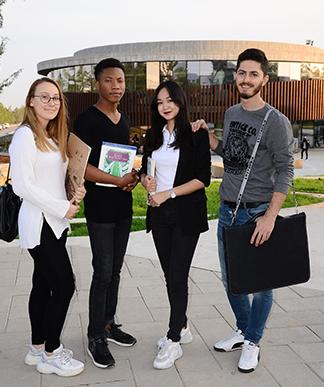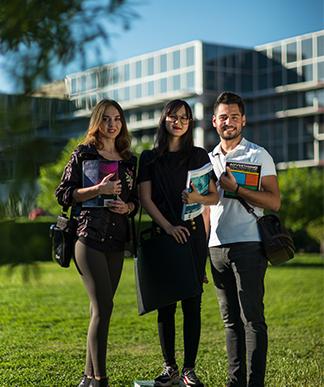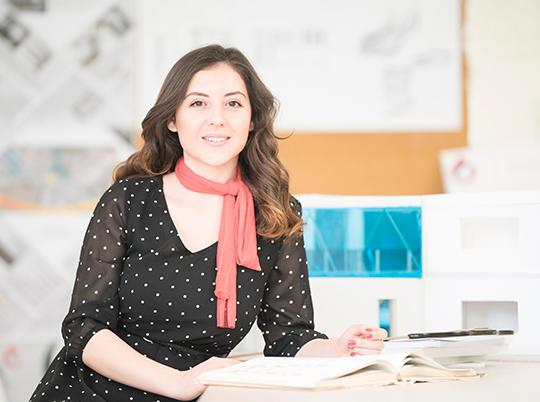


About the Program
The Doctorate of Architecture Course (Ph.D.) contributes to students’ theoretical and practical knowledge of architecture, the planning, designing and construction of buildings. Students are expected to carry out research, discuss and express their thoughts analytically in written and oral form.
The program allows for the learning of architectural theories and their application, methods and techniques in a variety of core and elective modules. As technology and economy are constantly developing, students are encouraged to become innovative, creative, independent, dynamic and productive researchers and instructors.
Students are required to continue the Doctorate of Architecture program for at least eight semesters and take seven core courses and a seminar. Assuming that they succeed in the Ph.D. qualifying examination, students successfully concluding the course must, in light of the suggestions from their supervisors, prepare a thesis on a topic contributing to the literature, and defend it before a jury.
Education Opportunities
Department of Architecture, within the body of the Institute of Graduate Studies and Research, has different qualities regarding; the relationship between educational context and scientific fields, the criteria for student acceptance, and the institutional framework of the architecture profession. Master of Arts in Architecture (M.A.), considering the multidisciplinary structure of the profession, covers the topics of architectural theory and methods, conservation and restoration, environmental design, and technology.
Considering the development and academic progress of the young academic staff, and ongoing accreditation processes; the Department of Architecture supports the education and research programs at the Ph.D. level including both projects for public service and societal, environmental, cultural, and technical dimensions.

Career Areas
Architects have an extensive field of study as they graduate from the Department of Architecture that enables them to work with different design disciplines. Graduates of this department can work as freelance architects or paid architects in an architectural office; open an architectural design office or take part in industrial or design process related with technology for the development and production of construction materials or concentrate on urban environment. They also have the opportunity to work in research and education in the academic environment.
An architect can have a successful career by accurately making use of human relations and psychology in all parts of creativity. Many architects have achieved successful professions in different fields such as literature, media, cinema, music, industry and entrepreneurship with their original perspective and creativity developed through architectural education.
Contact
Institute of Graduate Studies and Research
Graduate Sciences and Education Center, GE106
Tel: +90 392 671 1111 Extension: 2776
Institute E-mail: ciu-institute@ciu.edu.tr
Compulsory Courses
First Semester
ELECTIVE
Course code
ARCH5X1Credit
3Theoretical
3Practical
0Ects
8ELECTIVE
Course code
ARCH5X2Credit
3Theoretical
3Practical
0Ects
8ELECTIVE
Course code
ARCH5X3Credit
3Theoretical
3Practical
0Ects
8ELECTIVE
Course code
ARCH5X4Credit
3Theoretical
3Practical
0Ects
8ELECTIVE
Course code
ARCH5X5Credit
3Theoretical
3Practical
0Ects
8Second Semester
ELECTIVE
Course code
ARCH5X6Credit
3Theoretical
3Practical
0Ects
8THESIS
Course code
ARCH600Credit
0Theoretical
0Practical
0Ects
160SEMINAR
Course code
ARCH690Credit
0Theoretical
0Practical
0Ects
4Philosophy of Science
Course code
PHIL601Credit
3Theoretical
3Practical
0Ects
8Third Semester
QUALIFICATION EXAM
Course code
ARCH650Credit
0Theoretical
0Practical
0Ects
20Elective Courses
ARCHITECTURE AND THE CITY IN SCIENCE FICTION MOVIES
Course code
ARCH619Credit
3Theoretical
3Practical
0Ects
0INTRODUCTION TO ARCHITECTURAL RESEARCH
Course code
ARCH521Credit
3Theoretical
3Practical
0Ects
0DISCUSSIONS ON ARCHITECTURAL DESIGN FUTURES
Course code
ARCH603Credit
3Theoretical
3Practical
0Ects
ARCHITECTURE AND SCIENCE
Course code
ARCH607Credit
3Theoretical
3Practical
0Ects
CREATIVITY IN ARCHITECTURE DEISGN AND THE ROLE OF METAPHORS
Course code
ARCH621Credit
3Theoretical
3Practical
0Ects
SPACE, PLACE AND PLACE - MAKING
Course code
ARCH541Credit
3Theoretical
3Practical
0Ects
CULTURE AND SPACE STUDIES
Course code
ARCH604Credit
3Theoretical
3Practical
0Ects
ENVIRONMENT-BEHAVIOR THEORIES
Course code
ARCH601Credit
3Theoretical
3Practical
0Ects
AESTHETIC PHENOMENON IN ARCHITECTURE
Course code
ARCH606Credit
3Theoretical
3Practical
0Ects
PERFORMANCE OF BUILDING ELEMENTS UNDER ENVIRONMENTAL EFFECTS
Course code
ARCH612Credit
3Theoretical
3Practical
0Ects
HUMAN FACTORS IN ARCHITECTURAL DESIGN
Course code
ARCH526Credit
3Theoretical
3Practical
0Ects
PARADIGMS ON ARCHITECTURE
Course code
ARCH609Credit
3Theoretical
3Practical
0Ects
EFFECTS OF CLIMATE AND ENERGY ON SETTLEMENTS DEISGN
Course code
ARCH613Credit
3Theoretical
3Practical
0Ects
COMPOSITE BUILDING MATERIALS AND DESIGN PRINCIPLES
Course code
ARCH614Credit
3Theoretical
3Practical
0Ects
TYPOMORPHOLOGICAL ANALYSIS IN URBAN STUDIES
Course code
ARCH536Credit
3Theoretical
3Practical
0Ects
INFORMAL HOUSING
Course code
ARCH602Credit
3Theoretical
3Practical
0Ects
TURKISH TRADITIONAL HOUSE
Course code
ARCH622Credit
3Theoretical
3Practical
0Ects
ERGONOMICS
Course code
INAR505Credit
3Theoretical
3Practical
0Ects
10LIGHTING AND COLOR
Course code
GRDE504Credit
3Theoretical
3Practical
0Ects
0SPACE, FORM AND SUSTAINABLE TECHNOLOGY
Course code
ARCH529Credit
3Theoretical
3Practical
0Ects
INFORMATION SYSTEMS IN CONSTRUCTION PROJECTS MANAGEMENT
Course code
ARCH616Credit
3Theoretical
3Practical
0Ects
ARCHITECTURAL ENVIRONMENTS AND SPACE
Course code
ARCH524Credit
3Theoretical
3Practical
0Ects
GLASS STRUCTURE
Course code
ARCH537Credit
3Theoretical
3Practical
0Ects
0ARCHITECTURAL DESIGN IV
Course code
ARCT302Credit
0Theoretical
0Practical
0Ects
Philosophy of Science
Course code
PHIL601Credit
3Theoretical
3Practical
0Ects
8FEMALE STEREOTYPES IN DESIGN
Course code
GRDE516Credit
3Theoretical
3Practical
0Ects
8INTRODUCTION TO EXHIBITION DESIGN
Course code
INAR511Credit
3Theoretical
3Practical
0Ects
THEORY OF CONSERVATION
Course code
INAR514Credit
3Theoretical
3Practical
0Ects
ARCHITECTURAL HERITAGE RECORDING
Course code
INAR515Credit
3Theoretical
3Practical
0Ects
GRADUATE STUDIO I
Course code
ARCH501Credit
3Theoretical
2Practical
2Ects
10CONSTRUCTION PLANNING AND SCHEDULING
Course code
CVLE561Credit
3Theoretical
3Practical
0Ects
HISTORY OF FURNITURE AND ARCHITECTURE
Course code
INAR507Credit
3Theoretical
3Practical
0Ects
10LIGHTING DESIGN
Course code
INAR510Credit
3Theoretical
3Practical
0Ects
ARCHITECTURAL HERITAGE RECORDING
Course code
ARCH535Credit
3Theoretical
3Practical
0Ects
ENVIRONMENTAL AESTHETICS
Course code
ARCH530Credit
3Theoretical
3Practical
0Ects
DEVELOPMENT OF CONTEMPORARY ARCHITECTURE
Course code
ARCH520Credit
3Theoretical
3Practical
0Ects
DOCUMENTARY FILM AND TELEVISION
Course code
COMM622Credit
3Theoretical
3Practical
0Ects
10RESTORATION AND PRESERVATION I
Course code
ARCT305Credit
0Theoretical
0Practical
0Ects
DESIGN CULTURE
Course code
ARCT406Credit
0Theoretical
0Practical
0Ects
STATICS FOR ARCHITECTS
Course code
ARCT107Credit
0Theoretical
0Practical
0Ects
BUILDING PHYSICS I
Course code
ARCT209Credit
0Theoretical
0Practical
0Ects
HISTORY OF EUROPEAN ARCHITECTURE
Course code
ARCT212Credit
0Theoretical
0Practical
0Ects
RESTORATION AND PRESERVATION-I
Course code
ARCH305Credit
0Theoretical
0Practical
0Ects
Students who are interested in pursuing advanced graduate studies leading to a master’s, doctoral degree or professional doctorate degree for the Fall and Spring semesters every year. Applicants can directly apply online to our graduate programs using the application portal.
TR Applicants- Required documents:
- Bachelor’s and Master’s Degree Diploma
- Bachelor’s and Master’s Degree transcripts for each completed academic term/year.
- Valid ALES result in document (must not exceed 5 years),
- Documents to prove English proficiency for English language departments,
- Scanned copy of passport or identity card.
Click for detailed admission requirements information.
TRNC Applicants- Required documents:
- Bachelor’s and Master’s Degree Diploma
- Bachelor’s and Master’s Degree transcripts for each completed academic term/year.
- Documents to prove English proficiency for English language departments,
- Scanned copy of passport or identity card.
Click for detailed admission requirements information.
Students who are interested in pursuing advanced graduate studies leading to a master’s, doctoral degree, or professional doctorate degree for the Fall and Spring semesters every year. Applicants can directly apply online to our graduate programs using the application portal.
International Applicants- Required documents:
- A valid Bachelor’s Degree and transcripts for each completed academic term/year.
- A valid Master’s Degree and transcripts for each completed academic term/year.
- Evidence of English Language competence: TOEFL (65 IBT) or IELTS (5.5). Students without these documents will take the CIU English proficiency exam on campus following arrival.
- Scanned copy of international passport/birth certificate
- CV
- Ph.D. research proposal
- Fully completed and signed CIU Rules and Regulations document (which can be downloaded during the online application)
Click for detailed admission requirements information.
Cyprus International University provides academic scholarships for its students as an incentive for success, with most students benefiting from 50%, 75% or 100% scholarships or discounted tuition fees. Click for more information.
Tuition Fees are determined at the beginning of each academic year. Candidate students who are entitled to enroll in CIU can learn their fees in line with the Tuition Fee Calculation system.